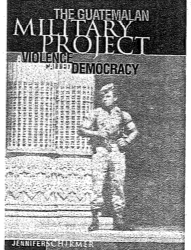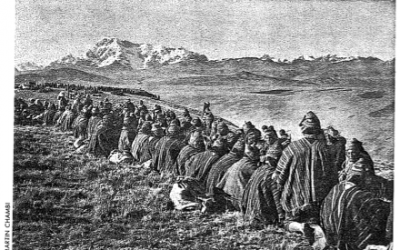The Internet and Challenges to Governance
Borders, Business, and War
On a sleepy New Year’s dawn, 1994, foreign news rooms were reading two very different news briefs on Mexico. One described the first day of NAFTA. The emphasis was on the peace and prosperity of North America. A second brief came from a group in Mexico’s Southern jungle that claimed to be on its way to take over Chiapas. A few minutes after sending their e-mails, the Zapatistas started a conflict that continues to date.
Although guerrillas have a presence in more than twelve Mexican states today, the Zapatista rebels are by far the best known. They inaugurated a new form of guerrilla warfare, which brought together bullets and cyberspace. While few have access to the Internet in Latin America, it is proving to be a very effective way of communicating with the developed world.
Over the past four years, as the government has killed dissidents, limited TV coverage, and expelled foreign activists from Chiapas, a series of cybersites have sprung up to fight back. These link people interested in Mexico, indigenous affairs, human rights, peace, feminism, and grass roots movements. When a community is under fire an electronic network ensures a rapid reaction from abroad. These efforts have been so effective that Mexico’s Foreign Minister characterized the conflict as a “war of ink and Internet.”
Despite the example of the Zapatistas, Mexico, and most of Latin America, is way behind in Internet access and knowledge industries. While approximately 26% of Americans use the Internet, 0.6% of Mexicans do. In mid 1997, the US had 1.3 million domains while Mexico had less than six thousand. Regional divisions within Mexico are even starker. If these issues are not addressed, it will be hard for Mexico to maintain control of its borders, destiny and economy.
Using the Internet to conduct war is simply one symptom of massive changes taking place throughout the world in our ability to transmit, understand, and use information. Global telecom, a $600 billion industry, is expected to triple within a decade. It is changing the way business, war, social discourse and governance occurs throughout Latin America. As groups and individuals undermine elite control over information, State sovereignty is quickly giving way to complex shared sovereignties. The Net can help the poor communicate cheaply, and minority communities can gather knowledge and support beyond their contiguous territory. At the other extreme, the Net is also forcing what are already a country’s largest companies to become far larger.
The Internet is simply the latest in a series of global communications trends that are altering the form and structure of governance. Already governments are finding it much harder to control the work, trade, and ideology of their citizens. Communications will continue breaking down formal State borders:
It is Cheap to Communicate. Most of the world is reducing trade barriers. As goods flow so do people, data, and ideas. The cost of communicating and comparing systems and ideas across borders has dropped radically. Before 1927, it was impossible to make a transatlantic phone call. Then, three-minute phone calls cost $200 in current dollars. Today it costs cents. Compared to the 1950s it now costs less than one third to fly somewhere, one twentieth to make a phone call, and about one seventieth as much to get a computer to access data.
Sprint charges ten cents per minute for some calls from the U.S. to Britain and Canada; it may cost three times more to call your neighbor from a pay phone. As the Internet and cellular networks, which do not require massive building and cabling, grow, the cost differential between local and long distance communication will become almost irrelevant. Not surprisingly, telephone use is growing very fast, particularly across borders. In Mexico, between 1990 and 1996, the number of international calls increased from 169 million to 491 million. One fifth of all long distance calls in Mexico go across borders. Immigrant communities today retain far closer ties to their homelands and are able to compare living conditions and ideologies.
You Can Communicate a Lot Very Fast. Think of phone-cable-satellite systems as pipes, to get more information you can increase the number of pipes and you can increase the capacity of each pipe. Driven by falling costs, both are happening very fast. Establishing a transpacific line cost $73,000 in 1975, $2,000 in 1996 and an estimated $200 in 1999. There are over twenty times as many transatlantic and transpacific connections today than there were a decade ago.
Each pathway is also wider. The bandwidth of communications systems is tripling every twelve months. In 1996, about four billion bits of information flowed into computer screens from the Internet every hour. Over the next four years, this was estimated to grow three hundred times. The transmission capacity already exists. In 1998 the fiber optic cables.
| Visitors to the FZLN Web Page (%)
|
could transmit over twenty five billion bits per second. Computers that cost as much as a television will be able to access and download the equivalent of large university or research institute libraries. Any nation, with good communications and smart people, will be able to grow jobs and salaries in the knowledge sector quickly.
The Problem is not Going to be Capacity to Transmit. Throughout Latin America, privatization, competition, and investment are leading to huge infrastructure backbones. Mexico has already increased the number of digital phone lines from 29 per hundred people in 1990 to 89.8 in 1996. Areas that are not hard wired can start receiving data via satellite. The Morelos III, has a footprint from the Southern US to Argentina. Antennas developed by Hughes Electronics will bring data into homes at a rate 1000 to 2000 times faster than current phone modems.
The Problem is Going to be Ability to Access and Process. Income and education differentials are critical. Many will not have the capacity to pay. Media access throughout Latin America is low. Chile and Argentina have about a third fewer telephones per capita than the U.S., Brazil, Mexico and Venezuela around one sixth less.
| Media Access
Source: World Bank. World Development Indicators 1997. p. 284-87. |
These differences are even more worrisome within a country’s borders. In Mexico’s southern states there are three to five phones for every hundred people, in northern states there are three to four times as many phones.
Building a knowledge economy is impossible without access to communications. These differences, if not addressed, will widen income gaps and potentially lead to very different worldviews within the same border. Yet, most Latin States lack a clear government policy to support and strengthen broad data access. Costa Rica is an exception. They have made enormous investments in attracting top computer companies like Intel, invested in communications infrastructure, wired almost every school, and instituted English courses in public schools. This contrasts markedly with Mexico’s policy of limiting educational expenditures and, in 1999, increasing taxes on phone calls 15%. Open and cheap communications and extensive training for a broad sector of the population are essential to development.
Future Wealth and Jobs Depend on Understanding and Using Knowledge and Communications. It is hard to explain how quickly the World’s economy is shifting. In 1997, for the first time, the world’s phone lines carried more data than voice. By 2003, some estimate that total voice traffic will be only 2% of total traffic.
| Average Banking Costs
($ Cost per transaction)
Source: Belltech. Published in America Economia. November 19, 1998. p. 209. |
Borders and governments can no longer protect many workers from international competition. The Internet obviates many work visas; if one can work at home, in an office or in a hotel room, one can surely work abroad with little interference. This is how Bangalore, India became the second largest software producer in the world. It products and labor cross borders in seconds with no interference. Most of its work is exported to the U.S., where Nielsen estimates 70% of corporations are on line, rather than Asia where 1% are on line. The incentive to restructure is enormous. In an industry like banking dealing with a customer’s requests on line costs 0.03% of what it costs to have requests taken care of by a bank teller. Most new jobs will involve dealing with information, not with people.
One Language, and a few Companies Worldwide. It does not matter whether you speak or write in Chinese, English, Dutch or Spanish or whether you are using a computer, camera, or cell phone, your data is transmitted in the same language. Information is increasingly digital; it is 1’s or 0’s. Telephones, TVs, pagers, VCRs, cell phones, CDs, movies, computers, financial networks and newspapers are starting to use and import data interchangeably. Because all data from and to these machines is in a common language we are seeing an enormous convergence of industries and businesses. The result is mergers across industries and mergers within industries. Several of these mergers are valued up to $70 billion. This is close to or larger than the 1995 GNP of all Latin American countries except Brazil, Argentina and Mexico.
Within the Latin American context, national television and telecom companies can seem massive, but in a global context they may become irrelevant. Telmex, which controls seventy percent of Mexico’s long distance and cellular markets, has accounted for one third of the Mexican stock market in the past. Nevertheless, as borders open, Telmex will have to grow very quickly to remain competitive. Government regulators will face difficult dilemmas: Should the company grow even more dominant within Mexico, by merging with a company like Televisa, or should it partner with companies abroad.
You Can Rule But you Cannot Hide. Telecom is a critical element in setting agendas, and, sometimes, in maintaining governance. As Latin America has democratized, a freer media, and the ability to gather and disperse information broadly are often leading to questions about “the way things have always been done.” To the dismay of many governments and companies, newly empowered citizens and reporters are publicly exposing practices that were “understood.” Exposes have lead to the resignations of Presidents Collor, Pérez and Bucaram.
The Internet will accelerate media freedom throughout Latin America. One could control press and electronic media to some extent, but it is much harder to censure thousands of different actors. Worldwide, Internet hosts went from 4 in 1969 to 727,000 in 1992 to over thirty six million by July 1998. In Mexico hosts increased from 50 in 1994 to 10,257 by August 1998. Who could possibly oversee and censor all these sites?
In conclusion, we can define trends, but it is hard to map all the changes occurring as communications redefines borders in business, national security and political coalition building. It is just as hard to map the Internet. America Online defines it as “the world’s newest and fastest growing country, possessing neither borders nor immigration restrictions, nor formal government, nor regulatory apparatus; a self-governing entity with a strong but benign commercial sector and a disputatious population, yet no standing army or formal legal system.”
What is certain is that country borders can and are being crossed with little regard for regulation. This is generating a new and very powerful parallel sovereignty across State boundaries. States that do not acknowledge that these changes are taking place, and that do not train and support their populations for dealing with an open knowledge economy, will be neither richer nor more secure in the future.
Winter 1999
Juan Enriquez, a DRCLAS Research Associate, is currently writing Flags, Borders, Anthems, and Other Myths, a book on the breakdown of borders. He was previously CEO of Mexico City’s urban development corporation and a negotiator in the Chiapas peace process.
Related Articles
Linking Latin America
I have captured images of such seemingly disparate subjects as Mennonite immigrants to Mexico, Latina contestants for Selena standings, the Pope in Cuba, and traditional Sunday serenatas…
A Violence Called Democracy
As any journalist or diplomat who has spent time in Guatemala will attest, no group there is more difficult to penetrate than the Guatemalan Armed Forces. As much a caste as an institution, the…
Researching Latin America
The instant outpouring of Web information on the Pinochet case got me to thinking about communications on my first trip to Chile during the Allende presidency. I was armed for Ph.D…




